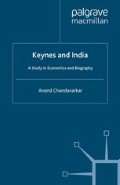Abstract
The strength, variety and continuity of the Indian Connection in Keynes’s writings and activities, prompts ‘the really interesting question’ which as Lytton Strachey said ‘is always the particular one’. How did the Indian Connection contribute to the making of Keynes the foremost monetary economist, policy adviser extraordinaire, international economic statesman, and the revered guru? What in the final analysis did India and Indians really mean to Keynes? Which, in the interface between Keynes and India, was more decisive and significant, the impact of India on Keynes, or of Keynes on India?
‘India is full of such wonders … To have done good work is something and I don’t the least doubt that I have done some.’ E. M. Forster
‘He achieved that rare and coveted combination of ‘Lakshmi’ (the Goddess of Wealth) and ‘Saraswati’ (The Goddess of Learning) in his own life … he added the celestial gift of an ‘Urvashi’ (The God Indra’s Dancer) to it by marrying Lydia Lopokova.’ B. P. Adarkar (Lord Keynes of Tilton — A Tribute)
Access this chapter
Tax calculation will be finalised at checkout
Purchases are for personal use only
Preview
Unable to display preview. Download preview PDF.
Notes
Bertrand Russell, ‘My Mental Development’ in The Basic Writings of Bertrand Russell, 1903–1959, (ed.) Robert E. Egner and Lester E. Denton (Simon and Schuster, New York, 1961), p. 43.
E. M. Forster, Goldsworthy Lowes Dickinson (Harcourt Brace Jovanovich, New York, 1973), p. 137 and p. 141, ‘The Chinese amused and charmed him in a way in which Indians did not’ and he confessed, ‘Clearly I’m Chinese and not Indian, though I believe I was Indian from the age of twenty to twenty-five and would have become an ascetic with the smallest encouragement’ (ibid, 145).
D. M. Bensusan-Butt, ‘Thoughts About the Benthamite Worm’, On Economic Knowledge (A Sceptical Miscellany) (Australian National University, Canberra, 1980), pp. 118–19.
Copyright information
© 1989 Anand Chandavarkar
About this chapter
Cite this chapter
Chandavarkar, A. (1989). Epilogue and Apotheosis: Keynes Indophilus. In: Keynes and India. Keynesian Studies. Palgrave Macmillan, London. https://doi.org/10.1057/9780230374775_10
Download citation
DOI: https://doi.org/10.1057/9780230374775_10
Publisher Name: Palgrave Macmillan, London
Print ISBN: 978-1-349-38926-1
Online ISBN: 978-0-230-37477-5
eBook Packages: Palgrave Economics & Finance CollectionEconomics and Finance (R0)

